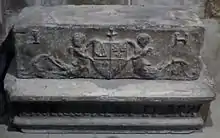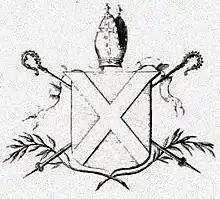John Hamilton (archbishop of St Andrews)
Dr. John Hamilton (3 February 1512 – 6 April 1571), Scottish prelate and politician, was an illegitimate son of The 1st Earl of Arran (in the Peerage of Scotland).[1]
The Most Reverend John Hamilton | |
|---|---|
| Archbishop of St Andrews | |
| Church | Roman Catholic |
| Archdiocese | St Andrews |
| Appointed | 28 November 1547 |
| In office | 1547–1571 |
| Predecessor | David Beaton |
| Successor | Gavin Hamilton |
| Other posts | Primate of Scotland |
| Orders | |
| Consecration | 22 August 1546 |
| Personal details | |
| Born | February 3, 1512 |
| Died | April 6, 1571 (aged 59) Stirling, Scotland |
| Nationality | Scottish |
| Parents | James Hamilton, 1st Earl of Arran & Mrs Boyd |
| Partner | Grizzel Sempill |
| Children | 6 |
| Previous post | Bishop of Dunkeld (1544-1546) |
Brother of the Regent
At a very early age Hamilton became a monk and Abbot of Paisley. After studying in Paris he returned to Scotland, where he soon rose to a position of power and influence under his half-brother, The 2nd Earl of Arran, who was serving as Regent. He was made Keeper of the Privy Seal of Scotland in 1543 and bishop of Dunkeld two years later; in 1546 he followed Cardinal Beaton as Archbishop of St Andrews, and about the same time he became treasurer of the kingdom.
In 1553 the Italian physician Gerolamo Cardano cured him of a disease that had left him speechless and was thought incurable. The diplomat Thomas Randolph recorded the "merry tales" rumoured about his methods still current in Edinburgh nine years later.[2] Cardano himself wrote that the Archbishop had been short of breath for ten years, and after the cure was effected by his assistant, he was paid 1,400 gold crowns.[3] While the Archbishop was unwell, his brother was persuaded to give up the Regency of Scotland to Mary of Guise.[4]
He made vigorous efforts to stay the growth of Protestantism, but with one or two exceptions persecution was not the policy of Archbishop Hamilton, and in the interests of the Roman Catholic religion a catechism called Hamilton's Catechism (published with an introduction by TG Law in 1884) was drawn up and printed, possibly at his instigation.
Having incurred the displeasure of the Protestants, now the dominant party in Scotland, the Archbishop was imprisoned in 1563. After his release he was an active partisan of Mary, Queen of Scots; he baptised her son, the future King James VI, and pronounced the divorce of the queen from Bothwell. He was present at the Battle of Langside.
Assassination of Regent Moray

John Hamilton, with his brother James, acquired a house on the south side of Linlithgow High Street in 1550.[5] In 1570 from this house, his nephew or close kinsman, James Hamilton of Bothwellhaugh, assassinated James Stuart, Earl of Moray, the Regent of Scotland. During the aftermath, John Hamilton later took refuge in Dumbarton Castle.
The castle fell to a surprise night attack, led by Thomas Crawford of Jordanhill, and Archbishop Hamilton was captured. Concerned lest the English should seek to have the Archbishop spared, the leaders of the King's party had Hamilton speedily tried and convicted of art and part in the murder of the Regent Moray and King Henry Stuart, Lord Darnley. At 6 pm on 6 April 1571, three days after his capture, he was hanged beside the Mercat Cross of Stirling.[6]
Children
Archbishop Hamilton had six children by his mistress, Grizzel Sempill, the daughter of Robert Sempill, 3rd Lord Sempill. Two of his children were legitimated on 22 January 1547 and 24 September 1548 respectively.
Notes and references
- "John Hamilton". Catholic Encyclopedia. Retrieved 18 February 2007.
- Bain 1898, p. 592: "There is a merry tale that Cardanus the Italian took upon him to cure the Bishop of St. Andrews of a disease judged by all incurable. He practised on him divers strange inventions hung him certains hours a day by the heels ... "
- Cardanus, Gerolamo, De Propria Vita Liber: His Own Life, Amsterdam, (1654), pp.136–7, (Latin)
- Melville, James, Memoirs of his own life, Brookman, (1833), 21, 73
- Protocol book of James Foulis, SRS (1926), nos. 85, 145.
- Dawson, Janes E. A., Scotland Reformed, pp. 275–276.
- Bain, Joseph, ed. (1898), Calendar of the State Papers Relating to Scotland and Mary, Queen of Scots 1547–1603, 1, Edinburgh: H M General Register House
- Rainer Haas, Allerlei Protestanten – Christus-Zeugen aus der Tudor-Zeit, darin: 5. John Hamilton – war der spätere Erzbischof von St.Andrews 1527 als Student in Marburg an der Lahn?, Nordhausen, 2010
- Chisholm, Hugh, ed. (1911). . Encyclopædia Britannica. 12 (11th ed.). Cambridge University Press.
 This article incorporates text from this source, which is in the public domain.
This article incorporates text from this source, which is in the public domain. - Herbermann, Charles, ed. (1910). . Catholic Encyclopedia. 7. New York: Robert Appleton Company.
- Stephen, Leslie; Lee, Sidney, eds. (1890). . Dictionary of National Biography. 24. London: Smith, Elder & Co.
External links
| Political offices | ||
|---|---|---|
| Preceded by David Beaton |
Keeper of the Privy Seal of Scotland 1542–1547 |
Succeeded by Lord Ruthven |
| Religious titles | ||
| Preceded by Robert Shaw |
Commendator-Abbot of Paisley 1525–1553] |
Succeeded by Claud Hamilton |
| Preceded by George Crichton |
Bishop of Dunkeld 1544/1546–1547 |
Succeeded by Robert Crichton |
| Preceded by David Beaton |
Archbishop of St. Andrews 1547/1549–1571 |
Succeeded by Gavin Hamilton |
| Academic offices | ||
| Preceded by David Beaton |
Chancellor of the University of St Andrews 1547–1571 |
Succeeded by John Douglas |
